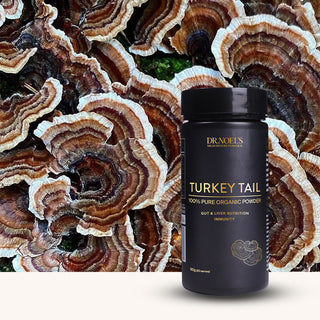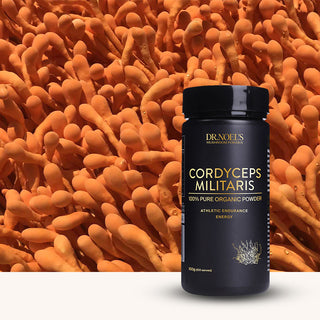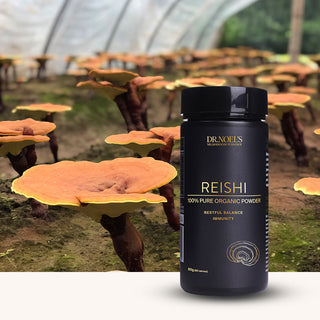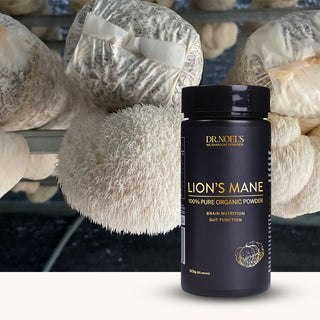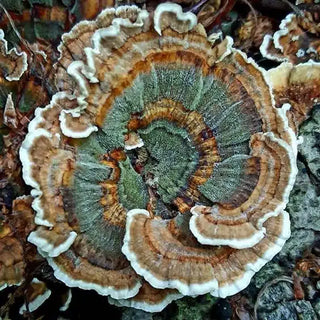Cancer is the leading cause of mortality, with roughly 10 million deaths, or one in six deaths, in 2020 due to the condition. The same year, breast and lung cancer accounted for 12.5% and 12.2%, respectively, of all newly diagnosed cases of cancer. Colon, rectum and prostate cancers are also common.
Understanding the role of complementary and effective anticancer treatments with little to no side effects can be helpful because anticancer drugs can have severe adverse effects. Functional mushrooms have been linked to several health benefits, and researchers are currently examining their potential to fight cancer.
Turkey tail mushrooms are one of many types of mushrooms that have been used for medicinal purposes for hundreds of years. While turkey tail mushrooms are reputed to have many health benefits, one that stands out is its reputation for strengthening the immune system to fight off cancer.
For centuries, people in Asia have turned to more than 100 different kinds of mushrooms to combat cancer. Some evidence suggests that Turkey tail mushrooms may be effective in doing so.
Researchers are still looking into the prospect of using Turkey tail mushroom extract or treatments to prevent or treat various cancers. Despite some promising study findings, Turkey tail cannot substitute drugs for cancer treatment. Cancer patients should only use them if their oncologist advises them to.
The article discusses the Turkey tail mushroom as a possible adjuvant therapy for cancer.

Exploring The Research Behind The Anticancer Benefits Of Turkey Tail
It has been demonstrated that hot-water extracts from the fruiting body of Turkey tail mushroom contain various polysaccharides that are effective against several cancers. It has been used as a cancer treatment for more than 30 years and is an approved pharmaceutical-grade drug in Japan.
The extract PSP has been utilized for late-stage lung cancer and as a prebiotic in clinical studies, while the mushroom polysaccharide PSK has been used as an adjuvant to chemotherapy to control gastric, colon, and colorectal cancer. Also, American doctors with training in botanical medicine have been known to recommend breast cancer patients Turkey tail mycelium-based products.
Turkey tail mushroom has several anticancer benefits, which are outlined below.
Turkey Tail may suppress growth of cancer
Much of the study on turkey tail mushrooms has focused on their ability to treat various cancers, and extracts from Turkey tail mushrooms are even approved as adjunct cancer treatments in Japan and China. Turkey tail mushroom extracts may be able to suppress the growth of certain cancer types due to their immune-boosting properties.
Several studies have investigated the impact of Turkey tail mushroom extracts on various forms of cancer. In a 2019 study, researchers evaluated the efficacy and safety of the Coriolus Versicolor as an adjunct therapy for cancer therapy.
This systematic review and meta-analysis of multiple studies included twenty-three trials involving 4,246 cancer patients. Turkey tail mushroom and Ganoderma lucidum mushroom were significantly associated with a lower risk of mortality compared with the control treatment.
In addition, there was no significant difference between Turkey tail and control treatment in the effect on relapse-free survival. Natural products from the mushroom also had a favorable effect on the elevated levels of CD immune cells. Researchers discovered in this meta-analysis that C. versicolor-related natural compounds may potentially affect overall survival and quality of life in cancer patients.
Turkey Tail may have anti-tumor activity
A 2017 study examined the anti-tumor activity of an anticancer glucan extracted from Coriolus versicolor. Mice were treated with the hot water extract from the fungus at three doses (40, 100, 200 mg/kg body weight) for 9 days. The tumor weight, proliferation of specific white blood cells and other parameters were studied. A significant decrease in tumor weight was observed at the glucan doses of 100 and 200 mg/kg. The results demonstrate that Coriolus versicolor glucan has anti-tumor activity towards sarcoma cells due to its immunomodulation activity.
In another 2015 systematic review, researchers examined Coriolus versicolor extracts and polysaccharide K for lung cancer. Polysaccharide K, commonly known as PSK or Krestin, is derived from Turkey tail fungus and is widely used as an adjuvant immunotherapy for cancer, notably lung cancer, in Japan.
For the comprehensive review and analysis, 31 reports from 28 research were considered. There were six randomized controlled trials, five non-randomized controlled trials, and seventeen preclinical investigations.
Fifteen of seventeen preclinical studies validated PSK’s anticancer benefits. This was achieved via modulation of the immune system and immune surveillance (a protective mechanism where the immune system recognizes and eliminates harmful substances).
Turkey Tail may inhibit the spread of tumor cells
PSK also demonstrated direct tumor inhibitory actions in vivo that reduced tumor growth and inhibited the spread of tumor cells. Non-randomized controlled trials demonstrated an improvement in various parameters that indicate survival, including median survival and 1-, 2-, and 5-year survival. Randomized controlled trials found improvements in immunological parameters and hematological function, body weight, performance status, tumor-related symptoms like weariness and anorexia, and survival.
PSK may improve immunological function, alleviate tumor-related symptoms, and increase survival in lung cancer patients. To understand this better, randomized controlled studies of PSK in lung cancer patients should be more extensive and rigorous.

Turkey Tail may improve overall survival in Gastric Cancer
PSK has been thoroughly studied in the setting of gastrointestinal malignancies, though. A review of several studies found that including PSK in the therapy intervention increased overall survival by up to five years and disease-free survival by up to seven years. The combination of PSK and chemotherapy was responsible for the survival gains.
PSK’s anti-tumorigenic and immunostimulatory properties appear to be particularly effective in stage 3 gastric cancer. In another RCT, chemotherapy with PSK (3 g/day) was related to enhanced survival in patients with stage II and III gastric cancer undergoing curative gastrectomy. Still, the benefit was dependent on the stage and the immune status.
Turkey Tail may improve quality of life in Breast Cancer
Breast cancer patients may also benefit from turkey tail mushrooms. In a Phase 1 clinical trial in the United States, women with breast cancer were given up to 9 g of Trametes versicolor per day for 6 weeks after radiotherapy. There were trends in higher lymphocyte counts at 6 and 9 g/day and increased NK cell functional activity at 6 g/day. There was also a dose-dependent rise in CD8+ T cells and CD19+ B cells, indicating an immunostimulatory impact.
In one case report, an 87-year-old woman with metastatic breast cancer was given 4 g of Turkey tail mushroom capsules twice daily while undergoing chemotherapy. Three and a half years later, the patient was still active and disease-free, but she continued chemotherapy as well as the Turkey tail mushroom supplements.
While on this course, the patient experienced no significant chemotherapy-related adverse effects. Researchers hope that Turkey tail mushroom capsules had an immunomodulatory impact that increased the efficacy of the chemotherapy in this patient.
An extract of Trametes versicolor (1 g/kg) reduced tumor weight by 36% and lung metastasis by 70% in mice with metastatic breast cancer in a preclinical study. The treatment stimulated the immune system, which was accomplished by potentiating immune cells.
Trametes versicolor was used in a medicinal mushroom blend called Breast DefendTM (100 mg/kg), which also reduced breast-to-lung tumor spread in a mouse with metastatic breast cancer. These studies suggest that Trametes versicolor may be an immunostimulatory adjunct in metastatic breast cancer.
Turkey Tail may reduce recurrence risk of Colorectal Cancer
Research has shown that Turkey tail mushrooms have beneficial effects on colon and rectum tumors. According to a meta-analysis of three clinical trials assessing 1,094 patients who received adjunct PSK therapy in the setting of surgically resected colorectal cancer, the inclusion of PSK can modestly reduce disease recurrence and enhance survival compared to chemotherapy alone. In all three studies, patients were followed up for at least 5 years after surgery and standard chemotherapy was compared with chemotherapy plus PSK.
Turkey Tail may help tackle cancer in dogs
Turkey tails can benefit more than just humans. This mushroom is also one of the most popular immunity boosters for your family’s pets.
The principal function of Turkey tail is to support the immune system of the person or pet who consumes it. This mushroom essentially increases the production of the cells that our bodies rely on to eliminate invading microorganisms or abnormal cells, such as those that develop tumors.
This mushroom also boosts the synthesis of specific cytokines, which are crucial immune system messenger signals. As a result, turkey tail increases longevity and a robust immune system.
Veterinarians were ecstatic about a Penn State University pilot study on PSP. It investigated the effects on dogs suffering from hemangiosarcoma, an aggressive and invasive malignancy with few treatment options. The findings demonstrated that PSP can significantly increase the longevity of a dog with hemangiosarcoma.
Hemangiosarcoma, a cancer of the blood vessels, is a very aggressive, toxic disease in dogs that progresses rapidly in most cases. Isolates of turkey tail mushrooms demonstrated the potential they did in extending the lives of dogs with this aggressive malignancy, which is highly encouraging.
A larger randomized clinical trial, examining the benefit of PSP in a more significant number of dogs with hemangiosarcoma was recently reported (8). The highest dosage (100 mg/kg), which had been the most successful in the earlier pilot study, was used in this more recent research. This study investigated the effectiveness of PSP alone or in combination with doxorubicin treatment in dogs with naturally occurring hemangiosarcoma.
There was a substantial difference in responsiveness to the PSP extract between male and female dogs in the 2022 follow-up research. The first pilot study groups had male and female dogs mixed together. The responses of the dogs were not graded based on their gender. However, in the follow-up trial, female dogs performed worse than male dogs were given PSP alone or PSP combined with chemotherapy.
Interestingly, while the mean survival time did not exceed the 199 days seen in the pilot trial, male dogs getting PSP alone performed as well as male dogs receiving chemotherapy alone. There was no measurable benefit to using PSP combined with chemotherapy in either males or females.
The ability of a single, isolated turkey tail molecule (PSP) to modulate the immune system was investigated in this study. However, the complete turkey tail mushroom extract may be more effective against cancer than the pharmaceutical mycelial isolates of PSP or PSK. This idea is based on the fact that the mushroom contains a wide range of bioactive chemicals. Compared to single isolates of PSP or PSK, a whole turkey tail mushroom extract has a full complement of chemicals that work synergistically to increase the host’s immune function.
Turkey tail is a fungus we recommend for pets since it provides a natural immunity boost. It is also beneficial for anti-aging. No matter how young and healthy your pet is, their immune system may always need a boost.
Benefits Of Turkey Tail Mushroom
According to decades of medical research investigations, Turkey tail mushrooms have an enormous potential to improve one’s health. The scientific literature from both the past and the present is full of references to the health advantages of these mushrooms.
Turkey tail contains numerous f primary and secondary health-boosting compounds. The secondary compounds are lesser-known medicinal elements such as terpenoids, flavonoids, and phenolic acids. 38 distinct phenolic chemicals, including quercetin and baicalein, were found by the researchers. Other natural plants and herbs contain these two phenolic chemicals, which have abundant study and value behind them.
The following are the health benefits of Turkey tail mushrooms:
- Improves immune system function.
- Reduces inflammation.
- Antiviral, anti-fungal and antibacterial properties.
- Boosts heart health.
- Improves digestion.
- Supports healthy liver.
- May have benefits for people with diabetes.
- Protects DNA from damage.
- Reduces symptoms of depression and anxiety.
- Helps relieve pain.
The reason that Turkey tail mushrooms are beneficial for cancer is because of the compounds inside. And only a high-quality Turkey tail powder can help provide these health-boosting effects.
Look for mushroom supplements that are made from whole fruiting body. Products labeled “Mycelium on Grain” are a quick and cheap way to produce mushrooms – by letting the mycelium grow on a sterile grain and then grinding it into a powder. The end product is primarily grain starch without the beneficial fruiting body.
Select mushrooms that have undergone a hot water extraction process to ensure complete extraction. Additionally, look for labels that list the beta-glucan content.
FAQs About Turkey Tail Cancer Benefits
What Is The Turkey Tail Mushroom Dosage For Cancer?
PSK has been administered in 3 g/day orally for up to 7 years as an adjuvant to chemotherapy. Patients with colorectal, colon, and stomach cancer receive this dose after surgery. The dose may be administered alternately with chemotherapy regimens lasting four weeks.
What Are The Side Effects OF Turkey Tail When Used As An Anticancer Agent?
Turkey tail mushrooms are typically thought to be safe. They occasionally have certain adverse effects to be careful of, such as darkened nail pigmentation, diarrhea, and darkened feces.
What Form Of Turkey Tail Is Best For Cancer?
In Japan, krestin, a preparation derived from the Turkey tail mushroom, has been used for many years as a supportive therapy in the treatment of cancer. These include gastric, lung, liver, pancreatic, and breast cancer.
What Is The Best Way To Take Turkey Tail Mushroom For Anticancer Effects?
Although it’s calming and healthy to drink tea, a capsule supplement is the most potent way to get a strong and effective dose of Turkey Tail mushrooms. Before taking Turkey tail, always check with a healthcare professional to ensure the supplement and dosage are right.
Can I Take Turkey Tail With Chemo?
Studies have shown that adding Turkey tail mushrooms to cancer chemotherapy may improve cancer cell death, boosted survival rate, and encouraged anti-tumor effects in cancer patients. The effectiveness of chemotherapy appeared to be increased by the adjunct application of the mushrooms.
Conclusion
Turkey tail mushrooms are typically considered safe—and perhaps even beneficial to health. According to research, these vibrant mushrooms may possess significant anticancer capabilities. PSK and PSP isolated from Turkey tail are widely used as adjuvant immunotherapy for cancer, and these compounds may inhibit the growth and spread of cancer while increasing overall survival.
References
1. PDQ Integrative, Alternative, and Complementary Therapies Editorial Board. Medicinal Mushrooms (PDQ®)
2. Frontiers in pharmacology. Coriolus Versicolor and Ganoderma Lucidum Related Natural Products as an Adjunct Therapy for Cancers: A Systematic Review and Meta-Analysis of Randomized Controlled Trials.
4. Integrative cancer therapies. Polysaccharide K and Coriolus versicolor extracts for lung cancer: a systematic review.
5. Oncotarget. Can polysaccharide K improve therapeutic efficacy and safety in gastrointestinal cancer? a systematic review and network meta-analysis.
6. Journal of Surgical Research. Immunochemotherapy benefits in gastric cancer patients stratified by programmed death-1 ligand-1.
7. ISRN oncology. Phase 1 Clinical Trial of Trametes versicolor in Women with Breast Cancer.
8. Global advances in health and medicine. Trametes versicolor (Turkey Tail Mushrooms) and the Treatment of Breast Cancer.
9. Phytomedicine. In vivo and in vitro anti-tumor and anti-metastasis effects of Coriolus versicolor aqueous extract on mouse mammary 4T1 carcinoma.
10. Oncology reports. BreastDefend™ prevents breast-to-lung cancer metastases in an orthotopic animal model of triple-negative human breast cancer.
11. Cancer Immunology, Immunotherapy. Efficacy of adjuvant Immunochemotherapy with polysaccharide K for patients with curatively resected colorectal cancer: a meta-analysis of centrally randomized controlled clinical trials.
12. Evidence-based complementary and alternative medicine: eCAM. Single agent polysaccharopeptide delays metastases and improves survival in naturally occurring hemangiosarcoma.
13. Veterinary and Comparative Oncology. Evaluation of the anti-tumour activity of Coriolus versicolor polysaccharopeptide (I’m-Yunity) alone or in combination with doxorubicin for canine splenic hemangiosarcoma.
